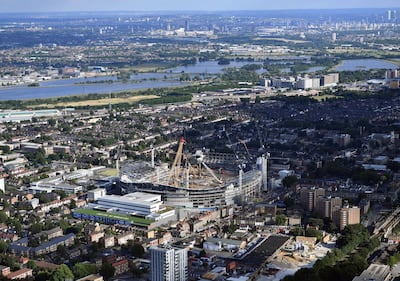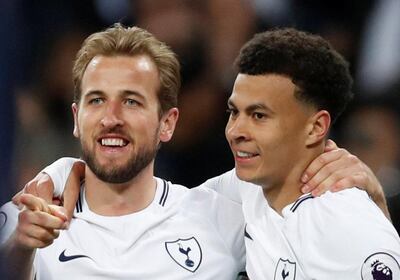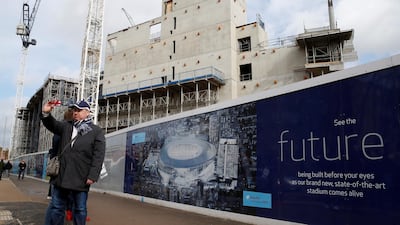They say moving homes is one of the most stressful experiences to go through in life. There are few mentions of how many sleepless nights are lost in renovating an existing abode, but as Tottenham Hotspur are finding out - at considerable cost - it takes more than a lick of paint and a new graveled driveway to keep up with the Joneses.
When the decision was made to upgrade White Hart Lane from 36,284 to a 62,062-seat stadium the estimated total cost was £400 million (Dh2 billion). The latest estimate is almost double that. Discussions for naming rights of the new stadium are said to be ongoing, with the club holding out for a 20-year deal worth £20m annually.
Whatever criticisms are leveled at chairman Daniel Levy - frugality is usually top of the list - Spurs operate at a profit under his stewardship. The North London club posted record revenue of over £306.3m for the year ending June 30, 2017, a significant rise on the the previous year of £209.8m.
This was achieved despite reduced gate receipts to allow for the demolition of the north-east corner of White Hart Lane midway through the 2016/17 season. The club's coffers for 2017 were in the pink to the tune of £41.2m, an increase of over £11m on the previous financial year.
As with any media-savvy club, Spurs have used the full force of their PR machine to keep fans updated on the re-developments of the stadium. The site of Levy in club-branded steel-toe boots and hard hat have become a nauseating fixture. The executive hod-carrier look is in no danger of catching on.
The temporary move to Wembley Stadium for the 2017/18 season was always the equivalent of crashing at your parents' house while the painters and decorators fixed up your own place. With works running behind schedule, Spurs could now be the kind of guests who overstay their welcome, with reports that the club are set to approach the Premier League to ask that their first games of the 2018/19 season be played away from home while the finishing touches are applied to their own home.

The current campaign was always going to be one of consolidation. A season unbeaten at home in 2016/17 as Spurs finished runners-up to champions Chelsea was always going to be difficult to repeat just 20 kilometres away at Wembley. A top-four finish and thus securing Uefa Champions League football upon return to their spiritual home was always the club's priority. With three games remaining and a five-point cushion over fifth-placed Chelsea, Spurs are on course to achieve it.
But Spurs would do well to look at the pitfalls that befell their closest neighbours in moving house. A move to the Emirates Stadium in 2006 was supposed to catapult Arsenal into a new stratosphere of football, on the pitch as well as spending off it. But the milestone soon became a millstone around Arsene Wenger's neck. Forced to balance the books while Arsenal repaid their debts, Wenger's hands, financially speaking, were tied. A team that had only two years previously gone an entire season undefeated were now settling for top-four finishes and inferior players. Wenger's career at Arsenal can be defined BE and AE - Before Emirates and After.
Season ticket prices at White Hart Lane in 2016/17 cost fans between £795 and £1,895. The price range for 2018/19 season tickets sees the cheapest ticket remain at £795 while the most expensive is £2,200, an increase of just over 16 per cent.
And while some may agree that the rise in cost is a price worth paying to help the team achieve success, the penny seems to have finally dropped (pun intended) on many, not least Tottenham's highly-regarded manager Mauricio Pochettino, that the move to a better stadium does not necessarily mean a loosening of Levy's notoriously tight purse strings to fund a better team.
_____________
Read more:
Comment: Harry Kane injury could be a blessing in disguise for Tottenham
Comment: English football needs to get off its moral high horse over diving
_____________
Pochettino acknowledged as much before Tottenham's 2-0 win over Watford on Monday, saying: "The move to the new stadium is not suddenly going to change everything and millions of pounds will rain from the sky. You have to manage and know exactly the expectations. It will be important to review and set the principles again. How it will be with the team once we move."
Just like Wenger, Pochettino may well find himself hamstrung by the club's bean counters when he wants to strengthen his squad in the summer. But rather than bringing players in the club's focus should be on keeping what they have and address a problem that has seen them lose too many world-class operators to compete with the likes of Manchester City and Chelsea for the Premier League title.

Levy is notoriously stingy when it comes to paying top dollar for top players. The ceiling on players' wages is set at a basic £100,000 a week even for the likes of 38-goal top scorer Harry Kane. That cap does not apply to Levy himself, however, with the club's most recent accounts showing the chairman earned £6m, including bonuses, last year, or £115,000 a week.
Spurs fans have been promised a shiny new stadium, replete with state-of-the art facilities and all the bells and whistles that go with it. What Levy and his fellow chairmen fail to grasp is that most supporters pay their hard-earned money to watch players play football, not use the toilets and eat an over-priced burger.
The likes of Kane, Dele Alli, Danny Rose, Eric Dier, Christian Eriksen, Mousa Dembele, Jan Vertonghen and the out-of-favour Toby Alderweireld are all expected to play at this summer's World Cup in Russia and will, if they aren't already, figure prominently on a number of top club's lists of those to watch.
When you factor in that most of those have been at the club long enough to see others move on and enjoy considerable success - Gareth Bale and Luka Modric at Real Madrid, Kyle Walker to Manchester City immediately spring to mind - no one would blame Kane et al from wondering whether their careers and their bank balances are better served away from North London.
If it has not already, the penny needs to finally drop on Levy: he can no longer get away with not paying top players their market value.


